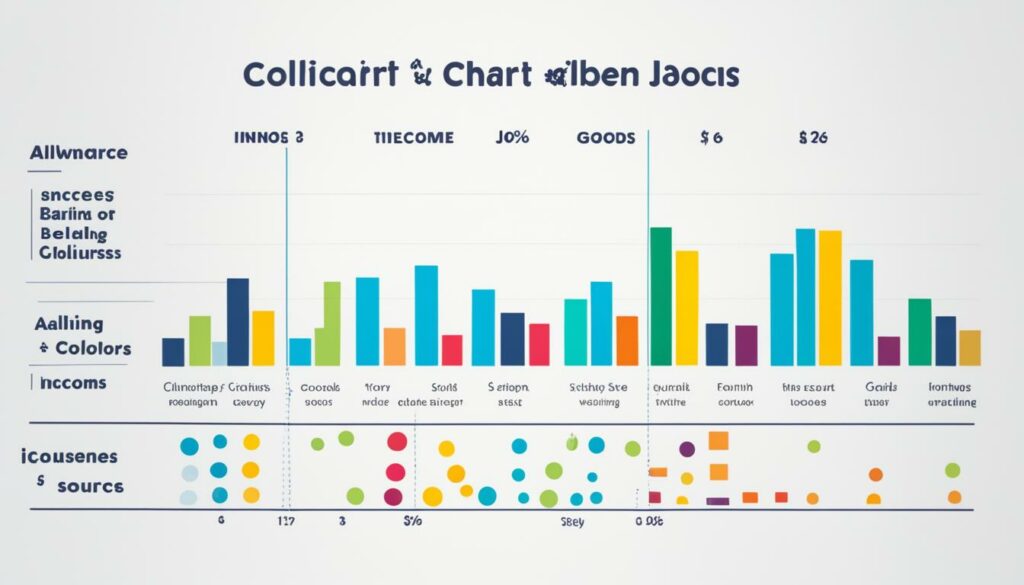Smart Budgeting Tips for Teens – Start Early!
Learning how to budget is an essential skill that can set teens up for financial success. By developing good money management habits early on, teenagers can establish a solid foundation for their future. In this article, we will explore some valuable budgeting tips specifically tailored for teens.
As a teenager, it’s important to understand how much money you make each month. This includes income from part-time jobs, allowances, or any other sources. By having clarity about your income, you can effectively plan your budget and make informed financial decisions.
Creating budget categories is a great way to organize your expenses. Consider allocating funds for saving, spending, and other specific goals or needs. By having clear categories, you can better track where your money goes and make adjustments as necessary.
When it comes to budgeting methods, there are several options to choose from. You could opt for the “Pay Yourself First” method, where you set aside a portion of your income for savings before spending. Alternatively, you may follow the 50/30/20 rule which allocates 50% of your income to necessary expenses, 30% to other expenses, and 20% to savings.
Prioritizing saving is crucial for achieving financial goals. By setting aside money regularly, you cultivate disciplined saving habits and create a safety net for unexpected expenses or future aspirations. Whether it’s saving for a car, college, or a dream vacation, putting money towards your goals is a smart move.
Tracking your spending habits enables you to understand where your money is going. It helps identify areas where you can potentially cut back or make adjustments to save more. By monitoring your expenses, you can gain control over your finances and make conscious choices about how to best use your money.
Remember, it’s okay to adjust your budget as needed. Life circumstances change, and your financial priorities may shift over time. A flexible budget allows you to adapt to new circumstances and ensure that your money aligns with your current needs and goals.
If you ever find yourself struggling with budgeting, don’t hesitate to seek help. Talk to your parents, guardians, or other trusted adults who can offer guidance and support. Utilize available resources such as books, podcasts, or financial apps to expand your knowledge and learn from experts in the field.
In conclusion, budgeting is an essential skill that teenagers can start developing early on. By following these smart budgeting tips, teens can lay a solid foundation for financial success and responsible money management.
Key Takeaways:
- Understand your income and create budget categories.
- Choose a budgeting method that works for you.
- Prioritize saving and set clear financial goals.
- Track your spending habits to identify areas for improvement.
- Adjust your budget as needed and seek guidance when necessary.
Know Your Income

The first step in budgeting is to know how much money you make each month. This includes income from part-time jobs or any monthly allowance you receive. Total up your income and use this as a guide for your spending and saving. If your income varies, it’s better to err on the safe side and stick to the smaller amount.
Understanding your income is essential to creating a realistic budget that aligns with your financial goals. By knowing exactly how much money you have coming in each month, you can make informed decisions about how to allocate your resources. Whether it’s earnings from a part-time job or a monthly allowance, every dollar counts when it comes to managing your finances.
Creating a comprehensive budget starts with a clear understanding of your income. By calculating your total monthly earnings, you lay the foundation for effective money management. This knowledge empowers you to make informed choices about spending, saving, and investing.
Having an accurate picture of your income is particularly important if your earnings vary from month to month. By basing your budget on a conservative estimate of your income, you can avoid overspending and ensure that you always have enough money to cover your expenses. It’s better to be cautious and work with a smaller income figure than to rely on potentially unreliable projections.
Create Budget Categories
When it comes to budgeting, creating clear and well-defined categories is crucial for teens. By organizing your expenses into budget categories, you can effectively manage your money and make smarter financial decisions. In this section, we will explore the essential budget categories for teens, including both saving and spending categories.
Saving Categories
When prioritizing your budget, it’s important to allocate a portion of your income towards saving for future goals and financial security. Here are some key saving categories that every teen should consider:
- Savings Account: Set aside a portion of your income for general savings. This can act as an emergency fund or for unexpected expenses.
- College Fund: If you plan on attending college or pursuing higher education, create a separate category for saving towards tuition fees, textbooks, and other educational expenses.
- Short-Term Purchases: Whether it’s saving up for a new gadget or a concert ticket, having a category for short-term purchases allows you to enjoy the things you want without compromising your overall financial goals.
- Long-Term Purchases: Similar to short-term purchases, long-term purchases may involve bigger-ticket items like a car or saving towards your first apartment. Allocating funds specifically for these long-term goals ensures that you are financially prepared when the time comes.
Spending Categories
While saving is important, it’s equally essential to allocate a portion of your income towards necessary and discretionary expenses. Here are some common spending categories that teens typically need to consider:
- Necessary Expenses: This category includes monthly bills like gas money, phone bills, and any other essential expenses that you need to cover regularly.
- Gym Memberships: For those interested in fitness or sports, budgeting for gym memberships or any other athletic activities you participate in allows you to maintain an active lifestyle while managing your finances responsibly.
- Entertainment: Every teen deserves to have fun! Budgeting for entertainment expenses such as movie tickets, outings with friends, or subscriptions to streaming services lets you enjoy your leisure time without overspending.
It’s important to note that if you are fortunate enough to have housing and utilities provided by your parents or guardians, you can exclude those expenses from your budget categories. This will help you focus on other financial goals and prioritize your saving efforts.
By having well-defined saving and spending categories, you can allocate your income effectively, ensuring that you have a clear vision of how your money is being utilized. This allows you to make informed decisions and stay on track with your financial goals.
Choose a Budgeting Method

When it comes to budgeting, there are various methods that can help teens effectively manage their finances. Choosing the right budgeting method can make a significant difference in achieving financial goals. Here are three popular budgeting methods for teens:
1. Pay Yourself First
The “Pay Yourself First” method is a simple yet powerful strategy that encourages teens to prioritize saving. With this method, you allocate a certain amount or percentage of your income to savings as soon as you receive it. By making saving a priority, you ensure that you are building your financial future right from the start. Whether it’s 10% of your income or a fixed dollar amount, committing to a regular savings contribution sets the stage for long-term financial success.
2. Zero-Based Budgeting
The zero-based budgeting method is all about allocating every dollar of your income until you reach zero. This approach involves estimating your expenses in each budget category and ensuring that your total income minus total expenses equals zero. By accounting for every dollar, you gain a comprehensive understanding of where your money is going and can make intentional decisions about your spending habits. Zero-based budgeting allows you to prioritize your expenses based on your individual financial goals.
3. 50/30/20 Rule
The 50/30/20 rule is a popular budgeting method that provides a simple framework for dividing your income into different categories. With this rule, you allocate 50% of your income to necessary expenses, 30% to other expenses, and 20% to savings. This method helps you strike a balance between meeting your immediate needs and wants while also building a healthy savings habit. By adhering to these percentages, you can ensure that you have enough for your essentials, enjoy some flexibility for discretionary spending, and consistently save for the future.
Remember, no single budgeting method works for everyone. It’s essential to choose the method that resonates with your financial goals, lifestyle, and preferences. Experiment with different approaches until you find the one that suits you best. The key is to start budgeting early and establish a solid foundation for managing your money.
| Budgeting Method | Description |
|---|---|
| Pay Yourself First | Allocate a certain amount or percentage of your income to savings as a priority. |
| Zero-Based Budgeting | Allocate your income until you reach zero, using estimates for each budget category. |
| 50/30/20 Rule | Budget your income based on percentages: 50% for necessary expenses, 30% for other expenses, and 20% for savings. |
Prioritize Saving

When it comes to budgeting, one of the most important habits you can develop as a teenager is to prioritize saving. By making saving a priority, you not only cultivate discipline with your money but also ensure that you have a safety net for the future. Saving money early on can provide you with a financial cushion that will come in handy for unexpected expenses, future investments, or even fulfilling your dreams and goals.
When you prioritize saving, you are setting yourself up for a secure financial future. It allows you to build an emergency fund, save for college or trade school, or work towards major purchases like a car or your first home. Saving money also teaches you the value of delayed gratification, encouraging responsible financial habits that will serve you well throughout your life.
Having clear goals in mind can provide motivation and focus for your savings efforts. Whether you have your heart set on a spring break trip with friends, starting your own business, or setting aside funds for your future family, setting goals will help you stay on track. By having a vision of what you want to achieve, you can better allocate your funds and make wiser spending decisions.
Remember, saving doesn’t have to be an overwhelming task. Even small contributions add up over time. By consistently putting a portion of your income towards savings, no matter how small, you are creating a habit that will benefit you in the long run. It’s never too early to start saving, and the sooner you do, the more time your money has to grow and work for you.
Track Your Spending Habits
![]()
One of the key aspects of successful budgeting is understanding where your money is going. By tracking your spending habits, you can gain insight into your financial patterns and make informed decisions about your expenses. Monitoring your spending allows you to identify areas where you can make realistic lifestyle swaps to save more money and achieve your financial goals.
One effective way to track your spending is by using a habit tracker. A habit tracker helps you record and reflect on your weekly expenses. It allows you to categorize your spending, ensuring you have a comprehensive overview of your financial habits. You can use a pen-and-paper tracker or opt for digital tools and apps specifically designed for budgeting and expense tracking.
When examining your spending habits, pay attention to recurring expenses and evaluate whether they align with your financial priorities. Are there any unnecessary expenses that you can cut back on? Consider areas where you can make adjustments and find opportunities to save money without compromising on your essentials.
“Tracking your spending habits is like shining a light on your financial decisions. It gives you the power to make intentional choices and take control of your money.”
For example, if you find that you’re spending a significant amount of money on daily coffee shop visits, consider making your coffee at home or investing in a quality coffee machine. Small changes like this can add up over time and contribute to significant savings.
Tracking your spending habits not only helps you better understand your financial behavior but also enables you to make informed decisions about your budget. By identifying areas where you can cut back or make changes, you can optimize your budget and work towards achieving your financial goals.
Benefits of Tracking Spending Habits
- Gain insight into where your money is going
- Identify areas for potential savings
- Make informed decisions about your expenses
- Optimize your budget and prioritize your financial goals
- Develop discipline and control over your spending
Adjust Your Budget as Needed
Creating a budget is an essential step in managing your finances, but it’s important to remember that budgets are not set in stone. As your circumstances change, you may need to adjust your budget to better reflect your current needs and goals. Here are a few tips on how to effectively adjust your budget:
Identify Problem Areas
Take a closer look at your budget and analyze where you might be overspending or underspending. If you consistently find yourself going over budget in certain categories, such as necessary expenses like gas or groceries, it may be time to reassess your allocations.
Reallocate Funds
Once you’ve identified problem areas, you can reallocate funds from one category to another. For example, if you’ve started using public transportation more and no longer spend as much on gas, consider reallocating those funds to boost your savings or allocate them to non-essential expenses like entertainment or personal hobbies.
Learn from Mistakes
Adjusting your budget gives you an opportunity to learn from past mistakes. Reflect on what led to overspending or budget shortfalls and implement strategies to prevent them from happening again. By being mindful of your spending habits, you can make more informed decisions and avoid unnecessary financial stress.
Remember, budgeting is an ongoing process. It’s normal to make adjustments along the way as you learn more about your spending habits and financial goals.
Review Regularly
Make it a habit to review your budget regularly. As your income, expenses, and financial goals change, it’s important to ensure that your budget reflects these changes accurately. Set aside dedicated time each month to review your budget and make any necessary adjustments.
By adjusting your budget as needed, you can ensure that your financial plan remains realistic and effective. Regular review and fine-tuning will help you stay on track and achieve your financial goals.
Continue reading to learn about seeking help and advice on budgeting in the next section.
Seek Help and Learn from Others
When it comes to budgeting, seeking help and guidance is a smart move. Don’t hesitate to reach out to your parents or other financial role models for advice and insights. They have valuable experience and can offer guidance tailored to your unique situation.
Additionally, doing your own research can provide you with a wealth of knowledge about budgeting. Read books written by financial experts who specialize in personal finance and budgeting for teenagers. These books can provide practical tips, strategies, and real-life examples to help you manage your money effectively.
Podcasts are another fantastic resource for learning about budgeting, especially if you’re interested in diving deeper into complex topics like investing. There are numerous podcasts hosted by financial experts who share their wisdom, answer listener questions, and discuss the latest trends in personal finance.
Take advantage of technology and social media to make budgeting fun and easy. There are budgeting apps like Mint that you can install on your phone, allowing you to track your expenses, set financial goals, and receive helpful reminders. These apps can help you stay organized and accountable, even when you’re on the go.
Follow social media stars who specialize in finance and budgeting. Many influencers and experts share valuable insights, tips, and tricks on platforms like Instagram and YouTube. By following their content, you can stay up to date with the latest trends and strategies in budgeting for teens.
Remember, seeking help and learning from others is not a sign of weakness. It’s a smart and proactive approach to improve your financial knowledge and ensure that you’re making informed decisions about your money.
Now that we’ve covered the importance of seeking help and learning from others in budgeting, let’s dive into the final section of this article, where we’ll summarize the key takeaways and provide some closing thoughts.
Conclusion
Budgeting as a teen is an essential skill that can pave the way for financial success in the future. By starting early and adopting smart money habits, teenagers can take control of their finances and make informed decisions from an early age.
Knowing your income is the first step towards effective budgeting. Whether it’s income from part-time jobs or a monthly allowance, understanding your financial resources allows you to create a budget that aligns with your income.
Creating budget categories is crucial for successful budgeting. Categorizing your expenses into saving and spending categories helps you prioritize your financial goals and manage your money better. From saving for long-term goals to setting aside funds for necessary expenses, having clear categories can guide your spending decisions.
Choosing a budgeting method that suits your lifestyle is another important aspect of successful budgeting. Whether it’s using the “Pay Yourself First” method, zero-based budgeting, or following the 50/30/20 rule, find a method that resonates with your financial goals and preferences.
Prioritizing saving allows you to build a safety net and work towards your financial aspirations. By saving first and spending second, you cultivate discipline and make saving a non-negotiable aspect of your budget.
Tracking your spending habits helps you gain insights into your financial behavior and identify areas where you can make adjustments. By monitoring your weekly spending and making realistic lifestyle swaps, such as brewing your own coffee instead of buying it, you can make smarter choices and save more money.
Adjusting your budget as needed is important as circumstances change. Whether it’s altering your budget to accommodate unexpected expenses or reallocating funds towards different categories, being flexible and adaptable ensures your budget remains effective.
Seeking help and learning from others can provide valuable insights and guidance in your budgeting journey. Talking to parents, reading financial books, listening to podcasts, and using technology and social media to explore budgeting resources can enhance your financial knowledge and help refine your budgeting skills.
By implementing these budgeting tips for teens and embracing good financial habits, you can take control of your financial future and make wise money decisions. Start early, be disciplined, and watch your financial success unfold.
FAQ
How do I budget as a teenager?
To budget as a teenager, start by knowing your income and creating budget categories for saving and spending. Choose a budgeting method that works for you and prioritize saving. Track your spending habits, adjust your budget as needed, and don’t be afraid to seek help and guidance when necessary.
How do I know how much money I make each month?
To calculate how much money you make each month, add up your income from part-time jobs or any monthly allowance you receive. If your income varies, it’s best to use the smaller amount as your guide for budgeting.
What should I include in my budget categories?
In your budget categories, include saving and spending. Under saving, list out categories such as a savings account, college fund, and short- and long-term purchases. Under spending, include necessary expenses like gas money and phone bills, as well as other expenses like gym memberships and entertainment. Exclude housing and utilities if they are taken care of for you.
What are some budgeting methods I can use?
There are different budgeting methods you can choose from, such as the “Pay Yourself First” method, where you immediately put a certain amount or percentage of your income into savings. Another method is zero-based budgeting, where you allocate your income until you hit zero, using estimates for each budget category. The 50/30/20 rule budgets your money based on percentages: 50% for necessary expenses, 30% for other expenses, and 20% for savings.
Why is it important to prioritize saving?
Prioritizing saving is important because it helps you practice discipline with your money and makes it easier to stick to your planned budget. It’s also a way to set goals and have a clear vision of what you want to achieve, whether it’s saving for a car or a trip with friends.
How can I track my spending habits?
To track your spending habits, you can use a habit tracker to monitor and reflect on your weekly spending. By tracking your habits, you can identify areas where you can make realistic lifestyle swaps to save more money. For example, if you’re spending too much on coffee, try making it at home instead.
What should I do if my budget isn’t working for me?
If you find that your budget isn’t working for you, don’t be afraid to make adjustments. If you’re consistently overspending on necessary expenses like gas, consider adjusting your budget to better fit that need. On the other hand, if you’ve stopped driving as much, allocate those funds toward savings or other non-essential expenses. Learn from your mistakes and use them to improve your future budgeting.
Is it okay to seek help with budgeting?
Yes, it’s okay to seek help and guidance when it comes to budgeting. Talk to your parents or other financial role models for advice. Do your own research, read books by financial experts, and listen to podcasts to dive into more complicated topics like investing. Utilize technology and social media to make budgeting fun and easy. Use apps like Mint to budget from your phone and follow social media stars who share financial tips.
Why is budgeting important for teenagers?
Budgeting is important for teenagers because it is a valuable skill that sets them up for financial success. By learning how to budget early on, teenagers can develop good financial habits and take control of their future finances. It helps with money management, financial responsibility, and the ability to make smart money moves.







